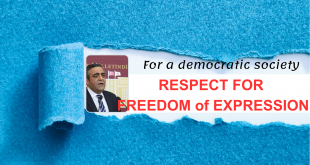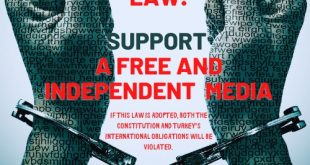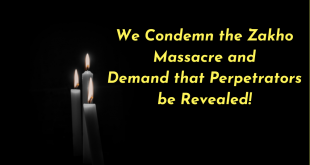Human Rights Center of the Faculty of Political Sciences of Ankara University and the Human Rights Joint Platform have organized a conference on Freedom of expression that will take place between 30th November – 2nd December in Ankara. The purpose of the conference is to discuss the new difficulties, with which the defenders of human rights and democracy are confronted in Turkey.
The discussion regarding the Freedom of expression has a long history going back to the foundation of the Republic in Turkey. These discussions have gained depth and width in the first place as a result of the decisions made by the European Court of Human Rights during the 1990’s and 2000’s and then after the EU Helsinki Council has accepted the status of Turkey as a candidate of accession. Numerous reform packages have been deliberated in and accepted by the Turkish Parliament to comply with the human rights standards of the European Union and a lot of work has been carried out in the Parliament to prevent the decisions regarding the violation of human rights by the European Court of Human Rights. In spite of this, the Freedom of expression has been and remains to be one of the most controversial human rights issues in the country. Numerous amendments have been made both in the Criminal Code and the Code on Fight Against Terrorism but the prosecutors have had no difficulty to find new and untapped provisions in the legislation in filing suits with the aim of penalizing the criticism of the state and government policies in sensitive issues although sentences have been considerably reduced for the convictions as a result of the above mentioned amendments. A new Criminal Code has been accepted in the Parliament in 2005 and some of the provisions of the Code on the Fight Against Terrorism have been amended last year. However, new investigations, examinations and convictions have followed these amendments. New suits have been filed against the writers, scientists and journalists and they have had to face the judges in the courts. Some of these cases have taken their places in the newspaper headlines.
However, it will be clearly seen that the basic areas of problem are neither home-grown nor are idiosyncratic to Turkey when we take a closer look at the discussions on the Freedom of expression in Turkey. Therefore, the conference intends to carry out comparative examinations of the problems in light of the internationally accepted principles. Consequently, presentations based on philosophical considerations and cases in the foreign countries have been included in the program of the conference. The purpose is the sharing of the information, thoughts and allegations regarding the Freedom of expression and the discussions on the Freedom of expression in the conference, of which the duration has been set forth as three days. The following headings will be discussed in the conference, which has been divided into four sections:
• Principles, international standards and Turkey
• Violence, terrorism and Freedom of expression
• Freedom of expression and sacred values religion, nation, flag, ..
• Freedom of expression and increasing protection: academic freedoms, arts, press and Internet
 HRJP Human Rights Joint Platform
HRJP Human Rights Joint Platform



